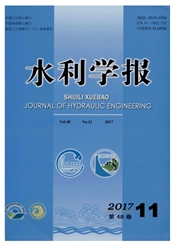

 中文摘要:
中文摘要:
针对水质评价中各评价指标的不确定性,将集对分析理论应用于水质综合评价中。先通过计算评价样本与评价指标之间的联系度对样本做初步分类,再对样本做进一步的同一、差异、对立的集对分析以判断评价样本的等级。在确定各评价指标的权重时,将信息论中的熵值理论引入该模型,运用信息熵所反映实测数据的效用值计算各评价指标的权重,使权重的分配具有一定的理论依据。最后运用蒙特卡罗法构造算例,讨论了实测过程中的随机观测误差对评价结果的影响。经实例分析,通过与综合评判法、属性识别法和模糊物元法的比较表明,基于熵权的集对分析模型的评价结果合理、客观。
 英文摘要:
英文摘要:
In view of the uncertainty of evaluation indicators for water quality the theory of set pair analysis is adopted.The samples are preliminarily classified by calculating the connection degree between the samples and evaluation indicators.Then the samples are further ranked through the identity,difference and antagonism set pair analysis.The weights of evaluation factors in the model are obtained from the avail value of data reflecting the information entropy,by which the weight allocation is more reasonable....
 同期刊论文项目
同期刊论文项目
 同项目期刊论文
同项目期刊论文
 A macro-scale hydrological model based on a spatial averaging approach: model structure and an appli
A macro-scale hydrological model based on a spatial averaging approach: model structure and an appli 期刊信息
期刊信息
